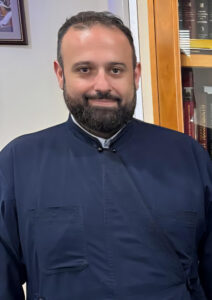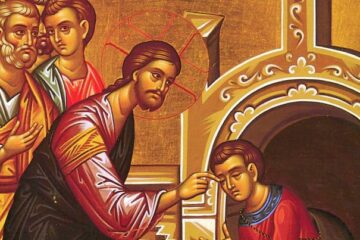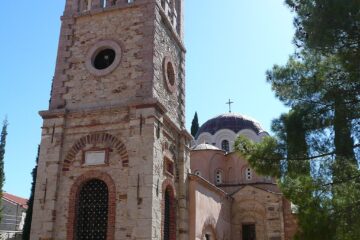By Fr. Michael Psaromatis
Greek Orthodox Archdiocese of Australia
We sit in quiet hospital rooms and watch the breath of someone we love grow light and laboured. We hold hands at bedsides, listen to the soft hum of machines, and wonder what it all means. In a world of relentless activity and constant noise, death arrives like a stillness we are not prepared for. And yet, even there, in the hush no words can fill, the Church whispers a word older than fear: Christ is with us, and His love is stronger than death.
In an age of medical advancement, psychological insight, and technological progress, our culture remains deeply confused about death. In the West, it is hidden from view, euphemised, or treated as an inconvenient interruption to comfort and success. Mourning is often privatised, compressed, or avoided. The fear of death, less as a moment than as an annihilation of meaning, identity, and relationship, haunts the modern soul. Orthodoxy answers this fear not with abstraction but with a Person: Jesus Christ, who conquered death by His own death and bestowed life upon those in the tombs (Paschal Troparion). The Church does not minimise the sorrow of death; she transfigures it through the Cross and Resurrection, so that death becomes not an end but an entrance into eternal communion. Modern philosophy often circles the question “Why is there something rather than nothing?” and reads death as limit; the Church answers that our fear is healed not by abstractions but by restored communion in Christ (Met. Hierotheos, The Fear of Death and its Overcoming).
Death is not part of God’s original design. Humanity was created for life, for unbroken communion with the God who is Life. As St Paul teaches, “through one man sin entered the world, and death through sin” (Romans 5:12). Yet even in the face of this rupture, God did not abandon His creation. As St Athanasius the Great writes, man, fashioned in the image and likeness of God, was destined for incorruption; by misusing the gift of freedom he became subject to corruption and mortality (St Athanasius, On the Incarnation). God’s response is mercy: the Incarnation. The Son becomes what we are, that we might become what He is. By His death, Christ destroys death; by His descent, He shatters Hades; by His Resurrection, He raises fallen Adam and all who lay in the graves (Paschal Troparion).
The Paschal proclamation, “Christ is risen from the dead, trampling down death by death, and upon those in the tombs bestowing life,” is the beating heart of Christian faith (Paschal Troparion). Death remains a mystery and a pain, because love grieves, but it has been robbed of its finality. For those in Christ, death is no longer separation; it is a passage into deeper communion with God.
For this reason, we do not speak of the faithful as “dead” but as having “fallen asleep in the Lord.” The word koimisis (κοίμησις) means “falling asleep,” and even our cemeteries, koimeteria (κοιμητήρια), are “sleeping places”: dormitories of hope where bodies rest until the general resurrection (1 Thessalonians 4:13). In every funeral the Church prays: “Give rest, O Lord, to the soul of Thy servant, in a place of light, a place of green pasture, a place of refreshment, where there is no pain, nor sorrow, nor sighing, but life everlasting” (Orthodox Funeral Service). And again: “For Thou art the Resurrection, the Life, and the Repose of Thy departed servant” (Orthodox Funeral Service). This is no mere consolation; it is the Church’s eschatological faith. The soul lives on, awaiting the day when Christ will come in glory and the dead will rise, truly, bodily, transfigured by grace (1 Corinthians 15:42–44).
The Final Judgement is not a cold audit of deeds but the unveiling of a relationship. Heaven and hell are not imposed from without; they are the soul’s free response to God’s eternal presence (cf. John 3:19–21). For the one who has loved, the divine Light is joy; for the one who has fled love, the same Light is experienced as pain. Thus the Church prays that the departed be “granted the joy of Thy desired homeland, and made a citizen of Paradise” (Orthodox Funeral Service). Heaven is not a reward for correct behaviour but the fulfilment of love, the embrace of the Father, the indwelling of the Spirit, the union with the Bridegroom Christ. As Archbishop Makarios of Australia notes, “The Church does not teach us how to become good and ethical people, but rather how to defeat death” (Archbishop Makarios of Australia, Paschal Message 2024).
To live eternally with Christ after death, we must begin to live with Him now. We must learn to die before we die, to put to death the passions that enslave us and to re centre life on God (Romans 8:13). Christ calls, “If anyone would come after Me, let him deny himself, take up his cross, and follow Me” (Mark 8:34). This denial is not self hatred but self transfiguration. It means prayer, fasting, almsgiving, humility, obedience, repentance, and sacramental participation, not out of fear of punishment but out of desire for God (Matthew 6; Acts 2:42). In Orthodoxy we do not flee sin because it violates a legal code; we flee it because it obstructs communion. St Porphyrios of Kavsokalyvia said, “Whoever desires to become a Christian must first become a poet… one must fall in love, yes, fall in love, with Christ” (St Porphyrios, Wounded by Love). Without this love, religion hardens; with it, even suffering becomes redemptive. Our weaknesses and wounds, the very crosses we carry, become, in Christ, the means of our healing (2 Corinthians 12:9). The Orthodox cure for the fear of death is not denial but healing of the nous: purification, illumination, and deification through repentance, watchfulness, and noetic prayer within the sacramental life, the lived therapy of the Church (Met. Hierotheos, Illness and Cure of the Soul; Orthodox Psychotherapy).
This synergy, our cooperation with grace, leads to theosis (deification, sharing in God’s grace, not His nature; 2 Peter 1:4). We come to participate in God’s uncreated energies and to be reshaped into the image of the Son. This is life’s purpose and the promise beyond death. When possible, the Church prepares the soul for this passage with Holy Confession and Communion, so that one may depart reconciled, renewed, and at peace in Christ’s embrace (Priest’s Service Book / Euchologion; James 5:14–16).
The Church does not erase grief; she redeems it. Christ Himself wept at the tomb of Lazarus (John 11:35). He did not weep for lack of faith, but because love grieves. Our mourning, united to prayer, becomes a path into deeper communion. “Death teaches us that it is urgent to love one another, and not to leave this life being bitter among ourselves,” Archbishop Makarios reminds us (Archbishop Makarios of Australia, Paschal Proclamation, Sydney 2024). We remember the departed by name; we offer memorials and Divine Liturgies, not as sentiment but as the continuation of love (2 Maccabees 12:44–45). Through the Eucharist, the Church on earth remains in living communion with those who have fallen asleep (Hebrews 12:1,22–24). This is why we light candles before icons at home, chant trisagion, visit graves, commemorate the fortieth day, and proclaim “Memory Eternal” (Αἰωνία ἡ μνήμη). We prepare kollyva (sweetened boiled wheat symbolising the resurrection; cf. John 12:24; 1 Corinthians 15:42–44) as a tangible proclamation that “what is sown is perishable; what is raised is imperishable” (1 Corinthians 15:42). The Fathers commend the memory of death, not a morbid fixation, but the sober remembrance that softens the heart, hastens repentance, and turns us toward love; St Peter of Damascus calls the fear of death “conducive to repentance,” and St Symeon the New Theologian says it spurs the renunciation of self will and the service of all.
I remember a young mother whose illness had run its course. She had laboured bravely, denying herself, lifting up her cross, and following Christ. As her breath grew faint, she asked to receive Holy Communion one last time. After receiving the Body and Blood of Christ, she smiled and said softly, “Fr Michael, even though my family will not understand, I want you to know that I am ready. If and when the Lord wills, I know He will protect my children.” Her passing was not resignation but a homecoming. Her peace did not come from an idea, but from a Person she knew in the Church’s sacramental life (John 6:54–57). She fell asleep on the Feast of the Protection of the Theotokos.
At the hour of death, we are not alone. The Church entrusts us to the Theotokos: “Most Holy Mother of God, intercede for us” (Paraklesis). When we commend a soul to God, we do so in the presence of the Theotokos and all the saints, whose intercessions encircle the departing like a quiet choir until the great assembly of the Resurrection. As St Paisios said, “For the person who lives united to Christ, death is a joyful event. We go from one room into another, brighter one” (St Paisios, Spiritual Counsels). And as St John Chrysostom exults in the Paschal homily, “Christ is risen, and life reigns” (St John Chrysostom, Paschal Homily). The Church as a spiritual hospital truly cures even the fear of death by leading us into this hope (Met. Hierotheos: Biology, Bioethics and Biotheology).
Our hope is not mere survival or a ghostly afterlife; it is full participation in divine life. The Christian life is not a checklist to gain entry to heaven but an invitation into communion with Christ, beginning now and continuing for ever (John 17:3). “He who believes in Me, though he may die, yet shall he live” (John 11:25). This is truth. Death remains the final enemy, but a defeated one (1 Corinthians 15:26). It causes pain, but not despair; separation, but not annihilation. For the Orthodox Christian, death is not a wall but a veil, not darkness, but dawn.
The Church, like a loving mother, stands with her children even in death. She sings, she prays, she weeps, and she proclaims, again and again, with unwavering voice, “Christ is Risen!” “Indeed He is Risen!” Let us not postpone our repentance or wait for the twilight of life to learn how to live (2 Corinthians 6:2). Now is the time to forgive, to return to the sacraments, to pray, to make peace. The Church gives us everything needed to live and die in Christ. Let us begin today, while it is still day, to love without measure, to reconcile from the heart, to seek mercy and to show it, so that when the hour comes we may go to Him whom we have learned to love here (John 9:4). “Because where there is a lack of joy, there God is absent, there the experience of Resurrection is absent,” writes Archbishop Makarios (Archbishop Makarios of Australia, Paschal Message 2024).
If you are reading this in fresh grief, light a candle before an icon, whisper the Jesus Prayer, and speak your loved one’s name to God. Ask your priest to commemorate them at Proskomide and to serve a Trisagion (Orthodox Christian Memorial Rite). Read Psalm 27 26 or 130 129 slowly. Offer a little kollyva or alms in their memory. Love does not end at the grave (Romans 8:38–39). Speak plainly about death, especially with the young, avoiding euphemisms, and surround the bereaved with prayer and the rites of the Church; gentle catechesis replaces dread with Resurrection faith (pastoral practice).
We go forward in the peace of Christ, trusting that those who sleep in Him are alive to God, and that in due time He will wipe away every tear (Luke 20:38; Revelation 21:4).
*****
 Fr Michael is a priest of the Greek Orthodox Archdiocese of Australia. He has studied Information Technology, Modern Greek, and Theology at Flinders University. With a deep love for music, theology, and arts Fr Michael brings a dynamism to his ministry.
Fr Michael is a priest of the Greek Orthodox Archdiocese of Australia. He has studied Information Technology, Modern Greek, and Theology at Flinders University. With a deep love for music, theology, and arts Fr Michael brings a dynamism to his ministry.
His 13 year ministry has included service in aged care, the youth, regional communities, and meeting the needs of busy Parishes with Presvytera Stavroula.
Fr Michael is also actively involved in Orthodox missionary outreach in the Pacific, particularly in Fiji. He has spent time in the region serving liturgy, engaging with local communities, and working towards the development of the mission.
He is currently serving at the Parish of St Dimitrios, Salisbury, in South Australia.



0 Comments